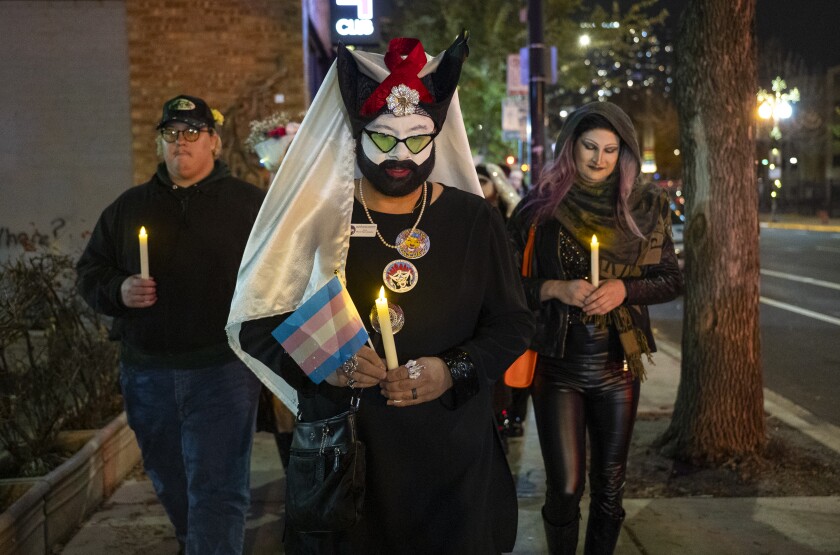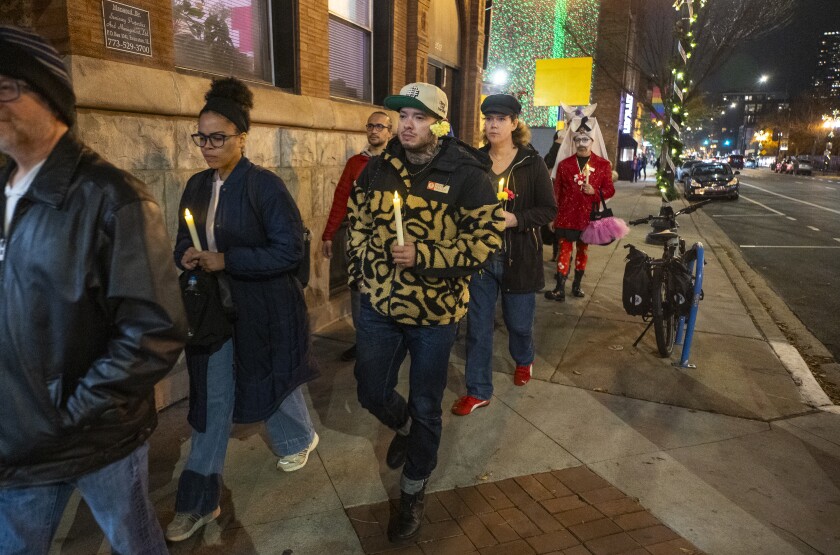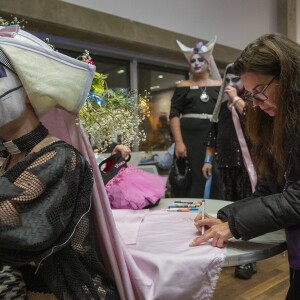Ethan Vazquez walked with 20 others down North Halsted Street holding electric candles Thursday night during one of many Transgender Day of Remembrance celebrations held throughout the city.
The day has been observed every Nov. 20 since 1999 as a way to honor members of the community who had died or been killed.
There are “too many [people] to choose from,” said Vazquez, a trans man and lifelong Chicagoan.
“It’s important just knowing there is support out there in times of grief — and that we won’t forget,” Vazquez said on the largely quiet mile walk.
But this year’s Day of Remembrance came amid an increasingly tough times for trans people: Major Chicago health institutions dropping trans youth care, federal threats to local schools and school systems over support for trans students, and Supreme Court rulings backing a gender care ban for youth in Tennessee and temporarily blocking accurate passports for trans people.
“This year we’ve seen the real threat of the administration,” Vazquez said. “The passport stuff is just the beginning, there’s a real present threat where before it was just talk. It feels more urgent.
In response, rapid response health care teams have stepped in to connect people to needed care, a state legal hotline was established and hundreds have taken to the streets to voice support for the trans community.
But even in Illinois — where many have fled as persecution against them ramps up in other states — 29 trans teens have died by suicide this year, according to a count by Trans Up Front Illinois, a volunteer, statewide trans youth advocacy group. That’s compared to four last year, and six the year before that.
“This administration is targeting our children, they’re trying to take the next generation,” executive director of Trans Up Front Asher McMaher said. “These kids can’t see the other side of it, so much has happened in not even a year, they can’t fathom the next three years or beyond that. … The discrimination, even in our sanctuary state, is awful and people are emboldened by this administration.”
The number is likely an undercount, as it only consists of cases reported to them.
The Cook County Medical Examiner’s office doesn’t keep track of when someone dies is transgender. Some trans people are misgendered in death records because they did not change their documents, office officials said. Children being closeted, not having supportive families that would make their identity known to the public and families’ fears of public backlash also can stop some from being reported, McMaher said.
It’s coincided with a sharp uptick in calls to the state’s suicide hotline specifically geared toward LGBTQ+ youth, 988, which remains standing after the federal government shut down the nationwide version in June. Illinois’ iteration has received more than 150,000 calls this year and is expected to surpass 180,000 by January — 12,000 more than last year.
It’s a pattern that has come with the expanding wave of legislation targeting trans people federally. According to a one study, states that passed anti-trans laws aimed at youth in recent years saw suicide attempts among trans teens increase by as much as 72% after the bills were signed.
Albie Gutierrez, a bilingual therapist with the Chicago Therapy Collective, said she has seen an increase in recent months for mental health care for trans patients, specifically those who are immigrants. The therapy group plans to expand its number of Spanish-speaking clinicians next year.
Gutierrez was also a friend of Elise Malary, a Chicago Black trans activist who fought for economic justice for trans people locally, and was found dead nearly three and a half years ago in Evanston.
Her manner of death was never determined, and Evanston police said there have been no updates in the case. Nearly 86% of CPD cases involving the murder of trans women had not been resolved, per a 2024 analysis of police data.
Sitting between a mural of her friend and a crosswalk painted like a Progress Pride flag — which some states have moved to outlaw in recent months — Gutierrez said what keeps her moving is knowing it’s what Malary would’ve wanted for her and others.
“She’s always on my mind… as are all the siblings who have passed throughout the years,” Gutierrez said. “I know they would want me to continue living and loving.”
McMaher said their organization’s biggest goal is to be visible in fighting for trans youth to inspire hope for the future, as past generations did before them.
“We are just trying to let them know we are still fighting for them and they deserve to grow up,” McMaher said. “Our ancestors and elders paved the way for us, and we’re paving the way for the next generation. … We’re gonna be here forever. We’ve always been here.”





